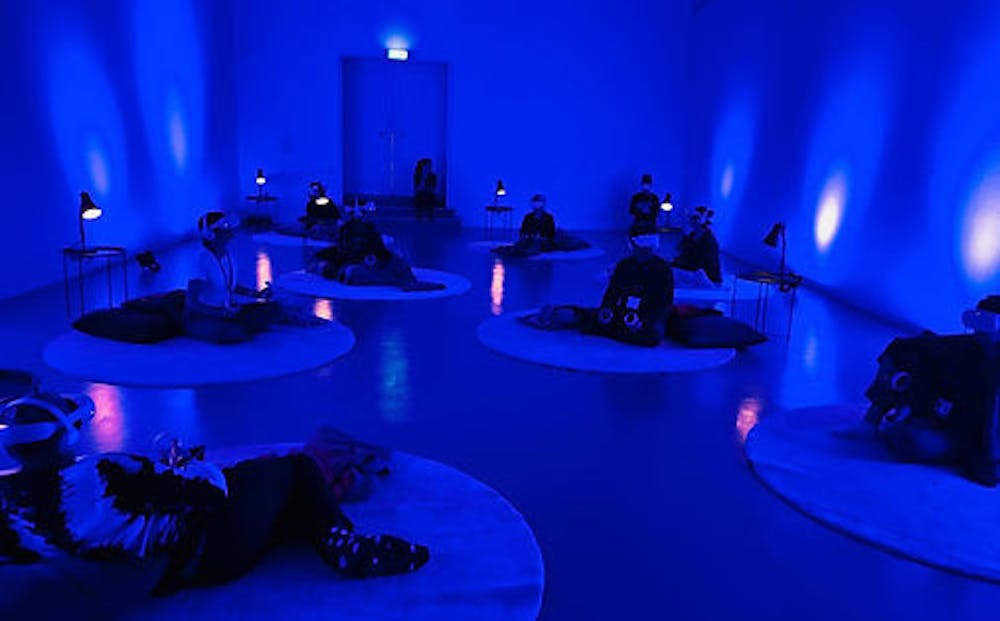A group of people walk into a dimly lit room, where several circle rugs, each with a pillow sitting on top, decorate the floor. Each viewer then picks a rug to sit on where a VR headset and hand controllers lie next to them. Every person in the room places their VR headset on, escaping reality and entering into a dimension called Slumberland.
“Slumberland” was brought to the Rubenstein Arts Center by Duke Arts Presents, formerly known as Duke Performances. This first-ever live VR performance by Duke Arts Presents was held from Sept. 6–10 in the Murthy Agora room in the Rubenstein Arts Center and was part of the Duke Arts Opening Week. "Slumberland" was created by Bombina Bombast, an award-winning performing arts company, and Lost In Time, a collaborating company in Sweden.
In "Slumberland," individuals get the chance to experience a live virtual reality performance where they assume the role of a compassionate “sleeper” who is guided to a place where one can rest.
A.Z. Kelsey, a production member of Bombina Bombast, said the performance began during the COVID-19 pandemic, with the idea of using a virtual way to continue creating live performances and rehearsing.
“We created a virtual stage where we could use all the tools of live theater, but just virtually, so lighting, sound, video, and then even things that we can't do on a real stage, like make things appear out of thin air,” said Kelsey.
When first entering the virtual space of Slumberland, the audience is invited to freely roam around to explore, which gives them a chance to get a feel of the VR headsets’ control handles and adapt to the space they will be in for the next 30 minutes. In the virtual reality, the audience is led by a guide through the cosmos exploring places of rest and hearing stories from sleepless youth about their experiences late at night. "The goal with the piece was to get a window into young people's experiences of sleeplessness and to shine a bit of a light on that,” said Kelsey. “We didn't realize that [these] youth are actually experiencing something akin to insomnia, if it's not exactly like what we usually call insomnia.”
The project began with interviewing youth around the city of Malmo, Sweden, with questions such as “What keeps them up?,” “What do they think about late at night?” and ‘What does the concept of Slumberland mean to them?” Not only do the audience get to hear these stories, but they are able to interact with them as well. The audience are invited to reach out and grab what appears to be a ball of light resembling a star. Each star contains a pre-recorded interview where the audience can hear from different restless youth.
“The technical intricacies behind the scenes are fascinating [and] I have a profound appreciation for the impact of arts in society, especially when combined with technology,” wrote Shyam Kumar Lakshmi Narayanan, a Master of Engineering Management student at Duke, in an email.
Narayanan has been working part-time with the Duke Venues and Production Management team, overseeing Duke University Box Office ticketing services. For "Slumberland," he has been assisting Kelsey with configuring the Meta Oculus headsets and managing the show.
“The most rewarding aspect of this role is being part of various Duke Arts events, broadening my perspectives,” wrote Narayanan.
As the performance continues its tour in the U.S., Kelsey hopes to expand the pool of interviews, getting more stories from people who experienced insomnia and sleeplessness. The stories being told would continue to be anonymous in order to build a sense of common understanding and empathy across borders and long distances.
Even though the performance uses technology, it is meant to draw attention to the prevalence of technology in our lives. According to Kelsey, “This paradox that we feel reflects the reality of the world we live in.”
“We can't have this kind of experience, this new theatrical experience, without the technological tools we're using,” said Kelsey. “But we're also asking everyone to calm down, slow down, put your devices aside and give yourself time that is for you.”
Get The Chronicle straight to your inbox
Sign up for our weekly newsletter. Cancel at any time.

Kerria Weaver is a second-year master’s student in the Graduate Liberal Studies program and an associate news editor of The Chronicle’s 119th volume.

